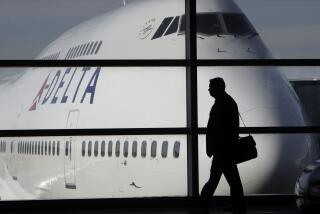Are airlines colluding to keep ticket prices up? Feds are investigating
- Share via
Packed planes and rising fares have pushed up airline profits — along with costs for cramped and harried travelers.
Federal investigators are now looking into whether airlines planned it that way.
The Justice Department on Wednesday confirmed a probe into alleged collusion by airlines to keep prices high and planes full by limiting the number of seats.
The department’s antitrust division is “investigating possible unlawful coordination by some airlines,” agency spokeswoman Emily Pierce said. She wouldn’t name the airlines and declined further comment.
Several airlines confirmed they had been contacted by the Justice Department, which requested internal documents from the last two years. The carriers denied unlawful behavior, saying that the industry has been highly competitive.
Airlines for America, a trade group for the largest U.S. airlines, said travelers are benefiting from strong competition and the growth of low-fare airlines.
“It is customers who decide pricing, voting every day with their wallets on what they value and are willing to pay for,” the group said.
News of the inquiry follows a request for an investigation last month by Sen. Richard Blumenthal (D-Conn.). He said he suspected collusion after reading that several airline executives at a trade group meeting in Miami talked about staying “disciplined” when adding more seats.
In his letter to the Justice Department, Blumenthal asked for “a full and thorough investigation of anti-competitive, anti-consumer conduct and misuse of market power in the airline industry, evidenced by recent pricing patterns as well as remarks made at the [International Air Transport Assn.] conference.”
As word of the investigation spread Wednesday, airline shares dropped. American Airlines fell 2.8% to $38.80; United Continental Holdings Inc. declined 2.5% to $51.69.
Analysts say the industry is strong and would weather possible antitrust fines.
“We remain positive on demand in the sector and think summer travel will be strong,” said Jim Corridore of S&P Capital IQ.
By limiting the number of seats, airline critics say, the industry has been able to keep fares growing steadily as fuel costs drop and demand for air travel climbs.
Domestic air fares rose an average of 2.5% last year, following a 1.9% increase in 2013 over the previous year, according to federal statistics.
At the same time, fuel costs — the largest expense for most airlines — have been plunging, dropping 41% in the past 12 months alone.
And planes have been packed: The percentage of seats filled on domestic flights rose to a record 84.5% last year, according to federal statistics.
Those factors have contributed to lofty airline profits. The nation’s largest airlines reported combined net income of $12.7 billion in 2013 and $8.5 billion last year, according to the Transportation Department. A big chunk of those profits came from fees to check luggage and change flights.
The health of the industry improved dramatically following mergers over the past decade that put control of about 80% of all domestic air traffic in the hands of four airlines and their regional carriers — United, American, Delta Air Lines and Southwest Airlines.
The most recent was the combination of American Airlines and U.S. Airways, which the Justice Department approved in November 2013 after suing to block it. The settlement required the carriers to sell gates and other facilities at seven airports, including Los Angeles International Airport.
Assistant Atty. Gen. Bill Baer called the record airline divestitures “a game changer” that would allow lower-cost carriers to operate more flights around the country.
Diana Moss, vice president of the American Antitrust Institute, said she wasn’t surprised to hear about the Justice Department’s investigation. She had objected to several of the airline mergers, warning that the consolidation could lead to price collusion.
“For the benefit of the American consumer and competition, this is an important move that the DOJ is making,” she said.
Critics say the investigation will increase distrust among air travelers who are frustrated by rising fees and shrinking seats.
“American consumers are already jaded enough about flying that we’ve been wondering for awhile how many more gut-punches they could absorb before we see a dip in air travel demand,” said Roger Dow, president of the U.S. Travel Assn., the trade group for the nation’s travel industry.
To prove collusion, industry experts say the Justice Department will look for emails, letters or phone calls that prove the airlines communicated about how much seating capacity to add. The agency is also expected to run an analysis to show whether air fares would be different if the carriers were cooperating with one another.
Short of direct evidence, Moss said, authorities likely will focus on industry officials’ public statements as well as economic analysis examining the frequency and timing of price increases or capacity adjustments across various airlines.
But Seth Kaplan, managing partner for the trade publication Airline Weekly, said a more likely reason for the restraint carriers are showing in adding capacity is that airline executives have learned from past mistakes when airlines expanded too fast and lost money or eked out razor-thin profit margins.
“They have consolidated and stopped oversupplying the market with seats,” he said. “But the profits they are making are still not anything that would make Google jealous.”
Times staff writer Christine Mai-duc contributed to this report.
More to Read
Inside the business of entertainment
The Wide Shot brings you news, analysis and insights on everything from streaming wars to production — and what it all means for the future.
You may occasionally receive promotional content from the Los Angeles Times.













